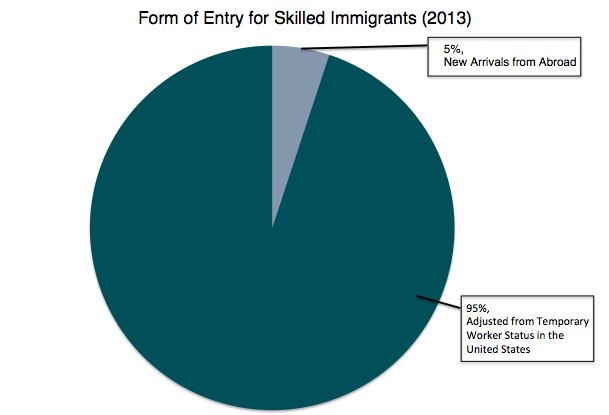Many opponents of immigration have focused their attention lately on the H-1B high skilled visa. Sen. Jeff Sessions (R-AL) claimed at a recent Judiciary Committee hearing that H-1B temporary workers “take jobs,” but don’t “create jobs” or start businesses like permanent immigrants do.
“I’m perfectly willing to discuss converting our immigration system to a more high tech oriented system,” he said. “But this H-1B program is a jobs program—it’s a temporary job process in which a corporation says that they can’t fill a job and they need a temporary worker. It’s not an immigration program. They’re not intended to come here and start a business that’s going to hire lots of people.”
This analysis is wrong in two ways. First, Sen. Sessions is wrong to draw a sharp distinction between H-1Bs and “immigrants” or permanent residents. In 2013, like prior years, 95 percent of all high-skilled immigrants—employment-based immigrant workers with at least a bachelor’s degree—adjusted their status from temporary to permanent in the United States. The H-1B visa has long been a gateway into the United States for immigrant entrepreneurs who create businesses that employ Americans.
If America were to eliminate the H-1B visa, it would strike at the core of much of the legal skilled immigration system. H-1Bs allow a company to hire a foreign worker and enables that employee to work during the lengthy and burdensome green card application process. This creates a win-win for both the worker and the business. Without access to the H-1B visa, immigrants would be forced to wait abroad for many months or years before the business could hire them, and skilled immigration to the United States would drop dramatically.
 Second, the analysis makes a faulty distinction between an entrepreneur who “creates jobs” and a worker who merely “takes jobs.” The reality is that a high-skilled worker can act as an entrepreneur within the company. By raising production and productivity in the firm, the skills of an H-1B allow the firm to expand and hire more workers to handle new tasks related to the increased productivity. A new invention, product, or process creates jobs whether the inventor is an H-1B temporary worker or an immigrant entrepreneur.
Second, the analysis makes a faulty distinction between an entrepreneur who “creates jobs” and a worker who merely “takes jobs.” The reality is that a high-skilled worker can act as an entrepreneur within the company. By raising production and productivity in the firm, the skills of an H-1B allow the firm to expand and hire more workers to handle new tasks related to the increased productivity. A new invention, product, or process creates jobs whether the inventor is an H-1B temporary worker or an immigrant entrepreneur.
This distinction isn’t lost on economists who have found that H-1Bs do, in fact, create wage gains for college-educated American workers of seven to eight percent per one percent increase in foreign STEM workers as a share of total employment. H-1Bs create new and better jobs for Americans, and Congress should reject calls to remove or restrict those workers.